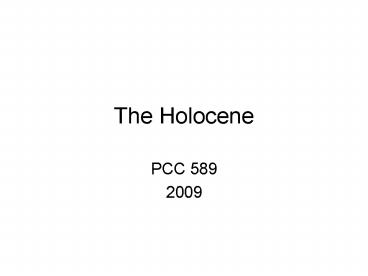The Holocene - PowerPoint PPT Presentation
1 / 50
Title:
The Holocene
Description:
Evidently, the Holocene at GISP2 is fundamentally different than the glacial period. ... On the other hand, during the Holocene, the 20-year variabilty is far greater ... – PowerPoint PPT presentation
Number of Views:133
Avg rating:3.0/5.0
Title: The Holocene
1
The Holocene
- PCC 589
- 2009
2
- Question 1)
- What does the Holocene look like compared with
glacial climate?
3
Greenland
4
The Holocene
5
The Holocene
about 1 K
6
The Holocene from a Greenland point of view
- Evidently, the Holocene at GISP2 is fundamentally
different than the glacial period. - Most people would attribute this to the huge
disruptions in climate caused by things like
Heinrich events, which case a great deal of
difference from one millennium to the next (but
which dont occur during the Holocene) - But how much does the rest of the world (outside
Greenland) care about whether it is glacial or
Holocene conditions?
7
Millennial-scale change
8
Cariaco Basin
What accounts For the Holocene variability at
Cariaco basin? Doesnt the variability appear
just as large on millennial timescales as it is
during the glacial? Many many other records look
just like this. So what is the cause of
millennial scale variability during the Holocene?
9
Santa Barbara Bioturbation
10
Point 1. The Holocene isnt necessarily less
variable than glacial climate. Many (most)
records suggest as much millennial-scale
variabilty during either time period.
11
- Question 2
- What does millennial scale variability mean,
anyway?
12
Example
- Random climate proxy data, annually averaged.
13
Example
- The same climate proxy data, millennially-
averaged. - Note the significant millennial-scale
variability!
14
Example
- Annually averaged and millennially averaged data
on the same vertical scale. - Oops, the millennial-scale variability is not
so important after all, is it?
15
GISP2 Calcium
- Calcium is a proxy for dustiness
- Red shows 1000-year averages, blue 20-yr
averages. - Note that the millennial-scale variabilty is
nearly as great as the 20-year variability. - Yes, the data really are at lt20yr resolution
throughout.
16
GISP2 Calcium -- the Holocene
- On the other hand, during the Holocene, the
20-year variabilty is far greater than the
1000-year variability.
17
Variability
- Point 2
- The only sensible definition of
millennial-scale variability is the magnitude
of variability in millennially-averaged climate
data. - This is important because all climate or climate
proxy data will display some variability from
millennium-to-millennium. The question is
whether it is important.
18
- Question 3. Okay, with the caveat about
magnitude, what does millennial-scale variability
look like during the Holocene, globally?
19
A popular cartoon version of Holocene variability
20
(No Transcript)
21
(No Transcript)
22
(No Transcript)
23
(No Transcript)
24
(No Transcript)
25
(No Transcript)
26
(No Transcript)
27
(No Transcript)
28
Point 3. There is a strongly held view that
millennial-scale fluctuations During the Holocene
have a discernible global pattern (in phase, or
out of phase), and can be linked to
solar variablity. But the data are rather a
messleading to Question 4) What do the glacier
records show?
29
Lateral moraines, Bylot Island, Canada
30
Greenland ice sheet margin
31
(No Transcript)
32
Point 4. The evidence seems rather good that
there is nothing coherent happening during the
Holocene. Balco writes The answer to the
question "were Holocene glacier Advances in the
Northern and Southern Hemispheres in phase, or
out of phase?" turns out to be "no."
33
Question 5. So do you mean its all noise? No
cause? No solar variability or thermohaline
circulation changes needed? Maybe, maybe not..
34
A bit of history
(much of what we think we know about the last
2000 years of climate is prejudiced by our
European historical knowledge and evidence of
glacier advances in Europe and North America
(hence the term little ice age)
35
The Holocene
about 1 K
36
1850 A.D.
37
The Holocene
It is often said that ltthe Little Ice age was
merely the largest And most recent of the
Holocene millennial-scale fluctuationsgt
about 1 K
38
(No Transcript)
39
Point 5. We probably ought to understand the
most recent 2000 years better than we do now.
40
(No Transcript)
41
A last point about the Holocene Evidence is
good that the long term changes in Holocene
climate are the direct response
Milankovich forcing
42
(No Transcript)
43
(No Transcript)
44
(No Transcript)
45
(No Transcript)
46
(No Transcript)
47
End
48
(No Transcript)
49
(No Transcript)
50
Taylor Dome Borehole Temperatures
Little ice age
Medieval warm period































